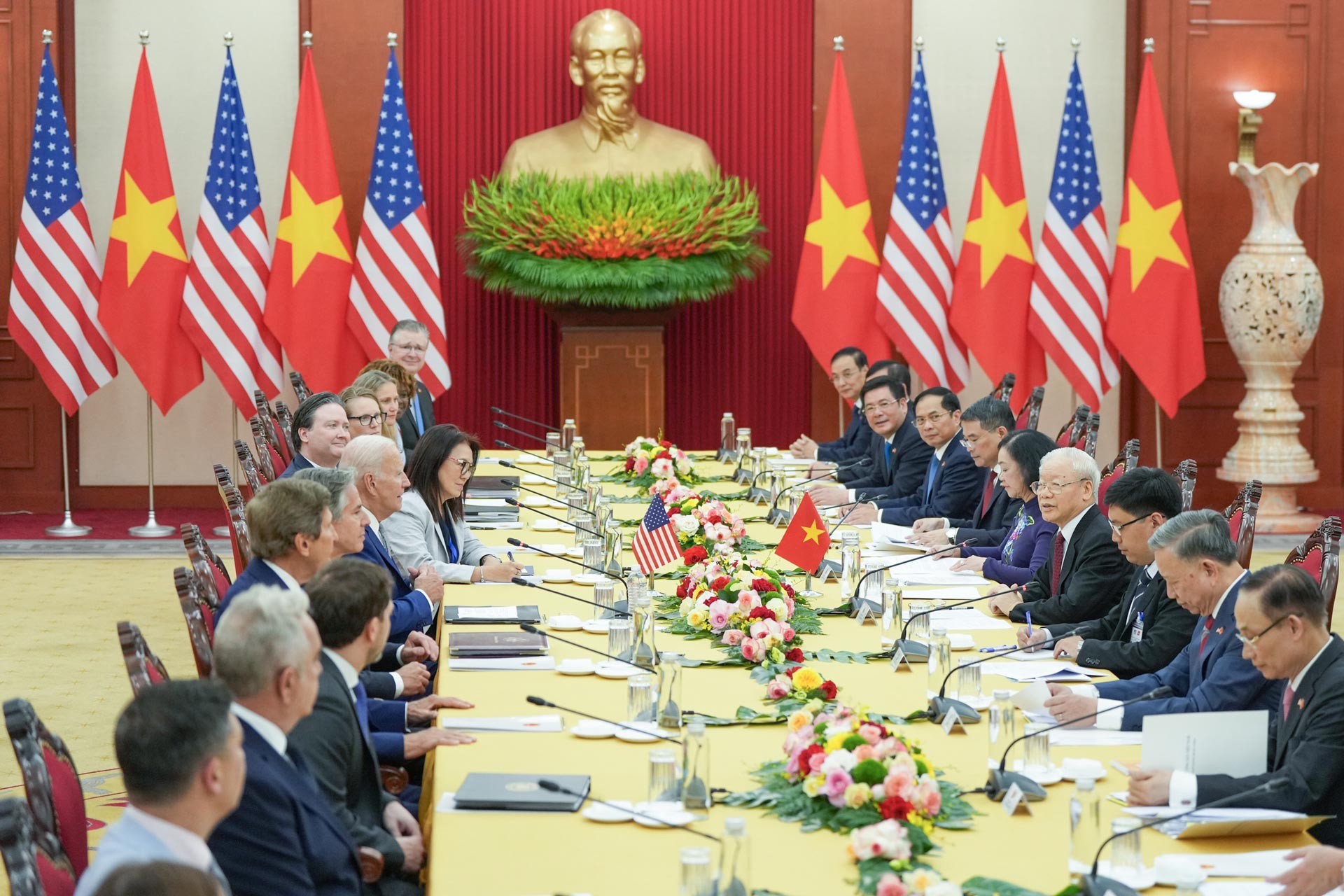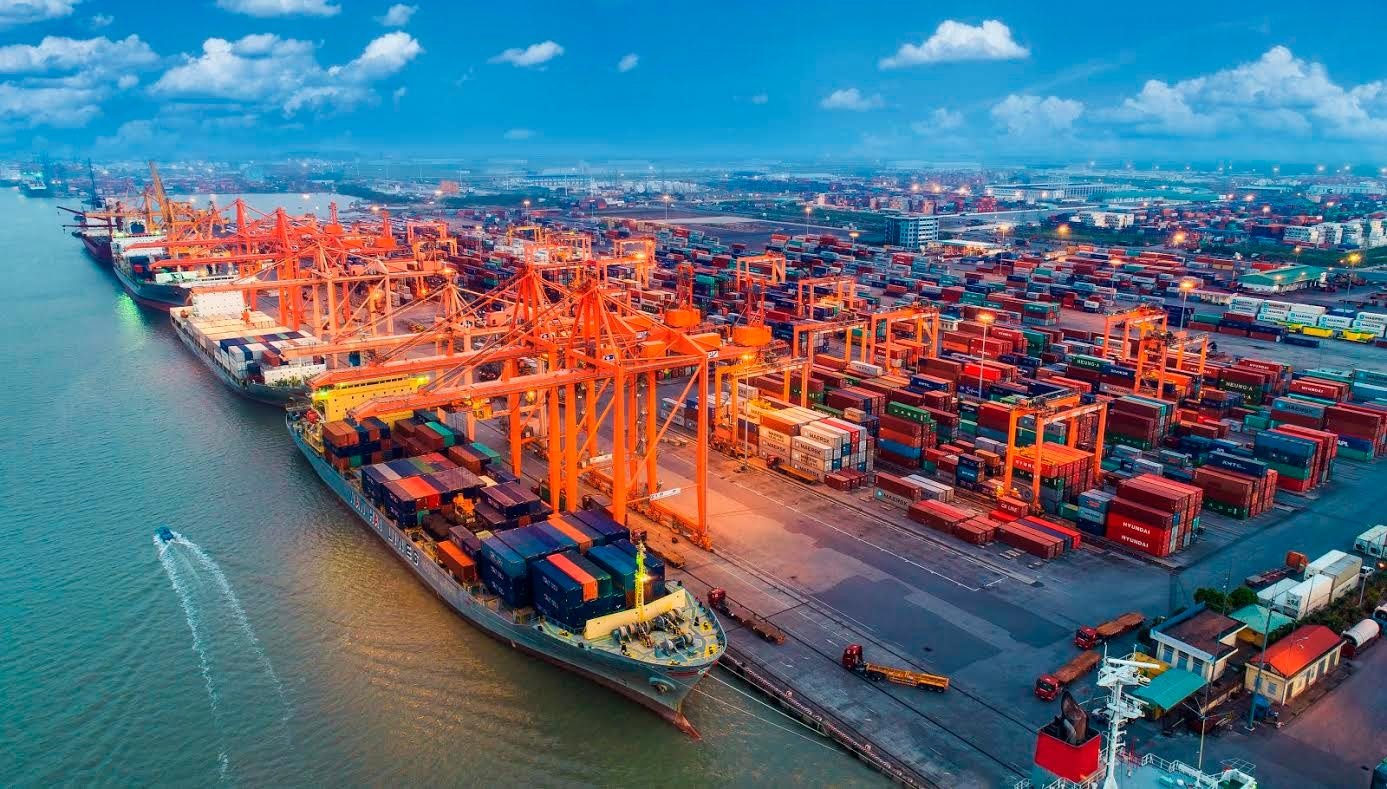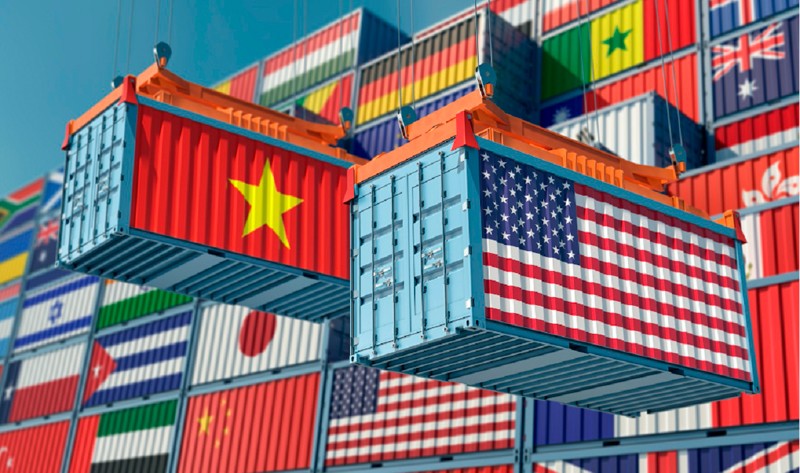
| With the trend of increasingly close cooperation between Vietnam and the United States, recognition of market status for Vietnam will help the two economies further expand trade and investment cooperation. |
| Vietnam officially requested the United States to consider and recognize market economy status in September 2023, during President Joe Biden's visit to Vietnam. The US Department of Commerce announced the review process would last 270 days, until July 26. On May 8, the US Department of Commerce held a hearing to hear arguments from relevant parties - this is an important step in reviewing, evaluating, and recognizing the market economy status of Vietnam. The United States' recognition of a market economy would reduce import taxes imposed on many Vietnamese products when entering the world's No. 1 market, and at the same time has an advantage in anti-dumping tax investigations. For example, with one of Vietnam's important export products - frozen shrimp, instead of being subject to the current tax rate of 25.76%, it may only be subject to a tax rate of 5.34% like seafood products from Thailand - a country recognized as a market economy. |
|
After 30 years of establishing diplomatic relations, Vietnam - United States trade turnover has increased nearly 300 times, reaching almost 111 billion USD by the end of 2023. The United States is Vietnam's largest export market and second-largest trade partner. Meanwhile, according to a report from the Ministry of Industry and Trade, in the first four months of the year, the US market continued to maintain the first position, with a turnover of over 34 billion USD, accounting for nearly 28% of the total export turnover of the country. It increased 19% over the same period last year. This country is in the top market group regarding imports, with 4.5 billion USD as of the end of April. 2023 is the third consecutive year that import-export turnover between Vietnam and the United States reaches 100 billion USD or more. According to fairly narrow regulations of the United States, the U.S. Department of Commerce will rely on a group of six criteria to consider whether to recognize a market economy or not, including the degree of currency conversion; negotiate salaries and wages between employees and employers; level of foreign investment in economic activities; issues of state ownership and private ownership; the degree of government control over certain resources and prices and other factors. Before the US hearing, Reuters commented, "Such a US recognition of Vietnam is consistent with the fact that Vietnam has become a destination for US businesses to diversify their chains" supplying from China - a strategy often called "friend-shoring", which means shifting production to economies with good political relations. An article by researcher James Borton at the Johns Hopkins Foreign Policy Institute (USA) published in March assessed that the recognition of Vietnam's market status would contribute to reducing trade barriers, making it easier and cheaper for US businesses to export goods and services to Vietnam. In addition, expert James Borton assessed that recognition of market status not only helps Vietnam increase trade and investment with the United States. In return, the benefits that US companies will get are greater market access opportunities and increased exports, increased output and production in Vietnam, especially in agriculture, machinery, aircraft, and pharmaceuticals. All contribute to promoting supply chain diversification, consistent with US interests. Vietnam's recognition as a market economy faces two opposing opinions. While retailers and many business groups support Vietnam, U.S. steel manufacturers and coastal shrimp farmers do not. The Southern Shrimp Alliance said that they disagree with the recognition of Vietnam as a market economy. In addition to several reasons (not yet proven), a lower tax on Vietnamese shrimp will harm the shrimp producer members of this alliance. Another unsupportive group, such as steel manufacturer Steel Dynamics, is concerned that Vietnam depends heavily on investment and input imports from China. Upgrading Vietnam's market status will "erode US domestic production" and benefit Chinese companies that have invested heavily in Vietnam, making it easier for these companies to circumvent U.S. tariffs. |
According to the Ministry of Foreign Affairs, at the recent hearing, the Vietnamese side clearly stated arguments, information, and data confirming that the Vietnamese economy completely meets the criteria of market economy regulations. At the same time, they said that continuing to be considered a non-market economy is not ideal for bilateral relations, which are increasingly close. Attorney Eric Emerson from Steptoe LLP law firm based in Washington (USA), representing the Ministry of Industry and Trade of Vietnam, assessed that Vietnam has met all six criteria created by the US Department of Commerce to recognize and adopt a market economy. “Vietnam has proven its performance on these statutory factors is as good or often better than economies that have received market economy status", Lawyer Eric emphasized. He pointed out that Vietnam has less intervention in state-owned enterprises than India, and is more open to foreign investment than Indonesia, Canada, and the Philippines... In fact, to date, 72 countries have recognized Vietnam as having a market economy, including large economies such as the UK, Canada, Australia, Japan... Vietnam participates in 16 free trade agreements. bilaterally and multilaterally with more than 60 partners spread across continents. Not long ago, according to Reuters, former US Ambassador to Vietnam Ted Osius, currently Chairman of the US-ASEAN Business Council, assessed, "Vietnam is already a market economy". Supporting Vietnam, he affirmed, "Vietnam meets important criteria well, such as currency convertibility and readiness to be recognized correctly. US businesses invest heavily in Vietnam because they recognize the growth potential of this economy". According to Ministry of Foreign Affairs Spokesperson Pham Thu Hang at the regular press conference on May 9: "the US's early recognition of Vietnam's market economy status will contribute to concretizing the commitments of senior leaders of the two countries, strengthening the comprehensive strategic partnership between Vietnam and the United States, thereby promoting economic and trade relations to bring practical benefits to businesses and people of the two countries". |
|
|
| With the burgeoning trade flows between the two countries and the White House’s push for the establishment of partnership agreement on the Indo-Pacific Economic Framework for Prosperity (IPEF), market status recognition would help Vietnam expand its trade and investment with the United States. Washington is presently Vietnam’s second-largest trading partner behind China and its largest export marker, with bilateral trade in 2022 valued at almost $139 billion. The bilateral benefits for US companies derived from recognition of Vietnam as a market economy include market access and export opportunities, namely in agriculture, machinery, aircraft, and pharmaceutical products, all of which contribute to the development of a supply chain that suits America’s interests. Over the past decade, Vietnam has emerged as a major manufacturing center, and remains a major source for consumer electronics, furniture, semiconductor and other components, apparel, and footwear imports. Market-status recognition would also contribute to a reduction in trade barriers, making it easier and cheaper for US businesses to export goods and services to Vietnam. It’s now time for the U.S. Department of Commerce to recognize Vietnam’s achieved market economy status. The decision reaches beyond goodwill between two partners since there are increasing environmental, economic and security threats that both nations can better address together.
Mr. James Borton, Non-resident senior fellow at Johns Hopkins/SAIS Foreign Policy Institute | VIETNAM SAYS US 'NON-MARKET ECONOMY' LABEL IS BAD FOR BILATERAL TIES Vietnam's Ambassador to the United States on Tuesday urged Washington to end its "non-market economy" label on Hanoi, warning that maintaining the resulting punitive duties on Vietnamese goods is bad for increasingly close bilateral ties. "Of course, we want Vietnam to be removed from the U.S. list of non-market-economy countries," Ambassador Nguyen Quoc Dzung told the Center for Strategic and International Studies, a Washington-based think tank, saying that Vietnam no longer deserved a status that applied to only 12 countries, opens new tab in the world. "Can you imagine, with what we've done, what we've been trying for, and look at the relationship between our two countries, is it acceptable that Vietnam is among the 12 countries ... the worst economies in the world?" "So it's not acceptable," Dzung said. "So I think if the DOC turned down that, I think it would be very, very bad for the two countries."
David Brunnstrom, Reuters Journalist. (Source: Reuters) | THE IMPROVING ECONOMY OF VIETNAM The economy of Vietnam is going though a dynamic shift, marked by robust growth and the development of several key trends supporting a stronger looking future. The IMF places Vietnam among the top twenty fastest growing global economies, with a projected GDP growth of 5.8 percent in 2024. Vietnam’s largest trading partner is China, with the US being its largest export market. This is likely to grow further with the signing last year of the Comprehensive Strategic Partnership with Washington, in preparation for the coming US recognition of Vietnam as a market economy. While the US are a fair way behind most of the rest of the world in this, it will allow an improved trading and tariff structure, likely leading to an increase of US engagement in and with Vietnam.
Pietro Karjalainen, Co-founding partners of Asian Insiders, Asian Insiders partner in Vietnam. (Source: Asian Insiders) |
Writer: Minh Anh | Design: LimDim | Photos: TTXVN, TG&VN...











